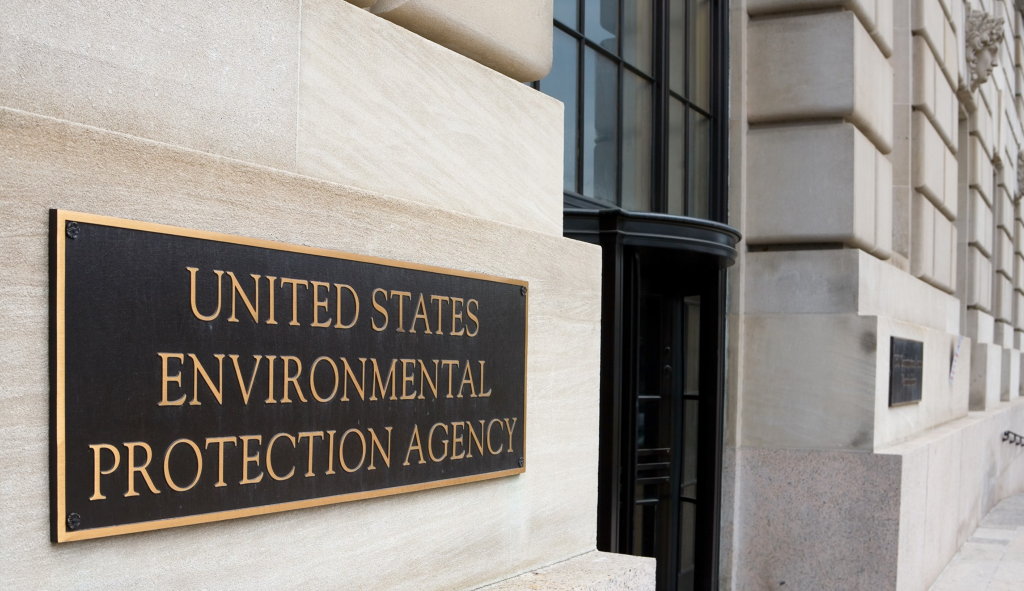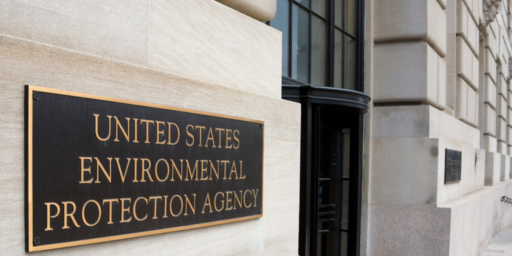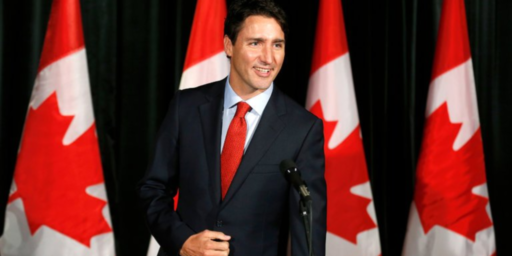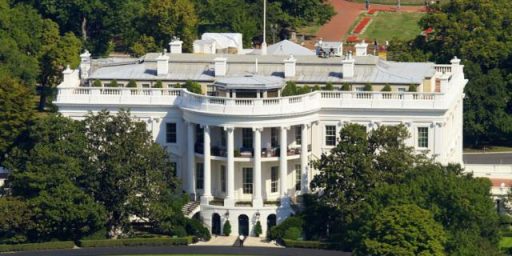A Comment on the Pruitt Resignation
He had to go (and should have been gone some time ago).
 I have seen a couple of versions of conservatives saying things along the lines “Pruitt was doing a good job, but he had to go” or some version of how he had a bunch of liberal enemies. There is no reason to qualify the statement that he had to go. He simply had to go.
I have seen a couple of versions of conservatives saying things along the lines “Pruitt was doing a good job, but he had to go” or some version of how he had a bunch of liberal enemies. There is no reason to qualify the statement that he had to go. He simply had to go.
Two quick points:
- Yes, any appointee to head the EPA is going to get a lot of criticism from the party out of power. Liberals are going to accuse a conservative EPA chief of ruining the environment due to deregulation and conservatives are going to accuse a liberal of ruining business via regulation.
- You can get either version of the above without a corrupt head of the agency.
In other words, yes, there are fights to have (some of which get ridiculously hyperbolic) over EPA policy. Those fights can happen with an ethical EPA director.
It is not hyperbole to suggest that Scott Pruitt has been one of the most brazen, obviously corrupt cabinet level official in recent memory. (I welcome correctives to this assertion–am I missing someone?).
Pruitt should have been removed some time ago, and that has nothing to do with policy. I would expect that the next head of the agency will have similar policy views. We could have had that months and months ago. Only a feckless president and a media cycle that swirls with the chaos that that president brings has allowed Pruitt to stay in office as long as he has. In any normal administration he would have be out long ago.
Update: Let me note the flip side of this: critics of Pruitt’s policy stances should not conflate them with his corruption (as the NYT editorial board did). Spoiler alert: liberals and environmentalists aren’t going to like the pro-business, anti-regulation approach of a Trump appointee. The corruption should be the focus. That should not be tolerated at all. Once that is handled, then we can return to our regularly scheduled policy debates.






Beyond the 16 things already being investigated, there were 3 more items that had been raised and not yet added to an official investigation.
So will Trump pardon him?
It depends on the kind of corruption. Let’s see:
1) Embezzling money from a government agency. This includes using agency funds for personal expenses, as well as outright theft of money.
2) Kickbacks from suppliers. This is probably the most common type of money-based corruption, and surprisingly it may not be necessarily bad. Yes, the supplies or services acquired will likely cost more, but they won’t necessarily be low quality or unsatisfactory.
3) Making policy or failing to enforce regulations in exchange for money. That’s a policy stand directly linked, dependent, and based on corrupt behavior. It is at its worst when a regulation or policy is established with the intent that those it affects will pay in order to be exempt from it. That’s outright extortion.
@Kathy: That is all corruption. Focus on that.
I understand that policy can be made in corrupt circumstance.
My point is: don’t conflate contributing to global warming or environmental degradation with cones of silence, tactical pants, or trying to get jobs for spouses (etc.)
@Steven L. Taylor:
They are conflated if Pruitt instituted policies or eased regulations in exchange for money or other considerations. Some of the allegations against him involve industry lobbyists.
@Kathy: Either I am being unclear or you are missing my point.
Note the last paragraph of the NYT piece I linked:
That is a conflation of corruption and policy. All that does is give fodder to the notion that Pruitt was really ousted not because of corruption, but because of policy.
@Steven L. Taylor:
I am always right, except when I’m not 🙂
My point is that any policies or lack of enforcement that are the result of payment by industry, are tainted by corruption and should, at least, be re-examined by a neutral third party. Therefore we cannot assume policies are one thing and corruption is another.
In the end he left because he was making the criminal organization in charge of the White House look bad.
But I concede policy had nothing to do with his departure.
And in Future Resignation news, Jim Jordan just told FoxNews that conversations in a locker room are not the same as official reports of abuse.
@teve tory: Given that, as a college staff member, he was not a “mandatory reporter” of child sexual abuse, I guess he’ll be able to get by any Federal charges that might have come his way. Morally, he’s right up there with the choir that we should be hearing from any minute now.
Now he’s calling one of the (five) accusers a liar. 😀
Which part of “environmental protection” is so hard to understand?
I have to endorse @Kathy‘s point here — you can’t draw a line between policy and corruption when the policy is the result of the corruption. If you were paid to have that opinion, you can’t separate the payment from the opinion.
Rick Wilson is one of the best truth-tellers when it comes to this corrupt, mucky swamp of an administration…any Republican who defends this slime in the White House is not doing his party or himself any favors…
@DrDaveT: Let me try one more time: there was enough corruption (a ton) that was pure, unadulterated self-enrichment. It should be the kind of thing that is opposed and criticized no matter one’s party. Pruitt committed enough sins of this type that he should have been ousted a while back. By mixing in policy partisans make this about something other than the obvious corruption.
Consider: a guy commits murder, but he also engages in some policy preference you don’t like, but that others love. Perhaps we could all just agree that he ought to be jailed for murder and let the policy debate be resumed with the next guy.
Making it about policy obscures the corruption in this case.
The NYT paragraph I quoted didn’t even say “his corruption led to bad policy”–it simply noted his bad policy alongside the corruption.
How about this: giving Republicans the chance to say that Pruitt’s resignation was just about Democrats being mean about policy obfuscates the corruption. It also helps obfuscate the general corruption in this administration.
When someone is this corrupt, we need to focus on that, not policy disagreements–especially since any replacement of Pruitt is going to follow the same policy pathway.
@Steven L. Taylor:
I understand your point, and I agree that tactically it is wise to focus on the things that nobody dares defend (like diverting taxpayer funds for personal indulgence) when making the case that he should have been fired long ago.
On the other hand, I think you are missing our point, which is that you are drawing a line between ‘policy’ and ‘corruption’ that assumes all policy positions represent actual values and beliefs — a philosophy of governance — that is distinct from venal self-interest. You are giving people like Pruitt too much credit when you do that, because their policy positions are not based on any philosophy of governance, but are themselves primarily driven by self-interest — either the policy benefits them personally, or they are expecting to be remunerated by someone else who would benefit if they promote the policy. That, too, is corruption, and should also be something that people on both sides of the aisle wouldn’t have to think twice about condemning once the facts are known. That it is seen as a partisan position says something unfortunate about our current politics.
@DrDaveT:
No, I totally get that. And while I not saying some of Pruitt’s corrupt behavior doesn’t fall into that category, I am stressing that there is enough other corrupt actions that it would be useful, as a society, to focus our attention there.
I am not giving Pruitt any credit. I am just saying he did amasses enough corrupt actions apart from this issue that we need to build a broader anti-corruption coalition on such matters. As soon as you start linking it to policy outcomes, you make the discussion (and the assessment of corruption) partisan.
-Using his staff for personal errands was not about policy.
-His spending on personal items (tactical pants, first class travel, the cone of silence, etc) was not about policy.
-Trying to use his position to get a job for his wife was not about policy.
-Giving out raises that he should not have been giving was not about policy.
And that is just off the top of my head.
If we can’t, as a country, focus on these kinds of issues and agree that such persons should ousted from office, regardless of whether we like or dislike what they are doing policy-wise (regardless of the motivation of those policy moves, i.e, some may be corrupt themselves) then we are in trouble.
In fact, that appears to be the case.
Why give cover to his defenders by bringing up policy? Why not just focus on the unadulterated corrupt actions?
Like I said in “Sanctuary Cities” thread, Pruitt was small-time both in grifting and policy.
He cadged a sweet deal on a condo, he installed a useless biometric lock and an equally useless “cone of silence” phone booth. He tried to get his wife a Chik-fil-a franchise and then a think tank gig. He abused travel /flight booking protocols and hired inordinate security for a person in his role. He had lackeys and minions do fetch quests for hand lotion and yogurt.
He was utterly corrupt and didn’t actually realize how much so until called on it. He had projected this behavior on his enemies and was flummoxed when called on it. He did not understand that his corruption was new and notable and actionable.
He was in the Hannity zone. He had no idea what he did was unethical and morally wrong or politically corrupt. He thought it was just standard conduct. All projection. He just assumed that his self-serving behavior was accepted and expected. He was doing what he assumed Obama – era officials did, so why are you bothering me about it?
Pruitt also delayed Obama-era actions and thwarted others, but he was not an eviscerator. He didn’t have the capacity to be straight out the gate. He didn’t understand the agency – thought it was just a fluff PR sanctum for socialist oil industry haters. Didn’t understand it had a mission and purpose.
Andrew Wheeler is not so foolish. Wheeler will eviscerate. Not just stonewalling / delaying recent Obama EOs (cuz that’s fun lulz), but real long-term policy gutting.
Pruitt was a very corrupt person who was also really bad at his job. Wheeler knows his job is to gut and to kill the EPA. And Wheeler won’t be distracted by skin lotion and special yogurt.
Fossil fuel companies sponsored Pruitt’s career. He was appointed to the EPA at their urging and to serve their interests. This is as corrupt as his penny ante grifts, and far more consequential. But at some level this is seen as serving part of your party coalition rather than selling favors. A view the Roberts Court shares with their apparent believe it ain’t corrupt absent a written, signed agreement for a quid pro quo.
So yes, it’s true he got fired for corruption. Rs will occasionally do the right thing, after the heat ramps up enough. Stories should focus on the corruption. It’s also true he was creating harmful policy to benefit his life long sponsors and I don’t see the harm in mentioning that this will continue under his successor. But the real problem is that beyond some order of magnitude, and if artfully done, corruption becomes accepted as part of the system. Isn’t this the swamp Trumpsky promised to drain?
This post from Booman is only marginally on topic as an egregious example of the sort of corruption that we seem to accept as part of our system, Read It and Weep.
Mueller has to keep digging until he shows evidence for why Trumpsky is so obsequious to Putin.